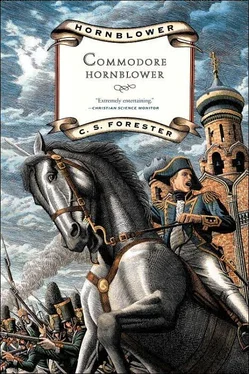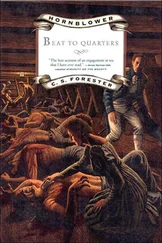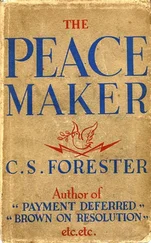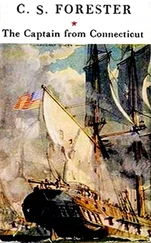Alone in his cabin, Hornblower opened his desk and found himself pen and ink. There was little enough to add to his official despatch. He read the last words—‘I wish most strongly to call Their Lordships’ attention to the conduct and professional ability of Commander William Vickery and Lieutenant Percival Mound.’ Then he began a new paragraph. ‘I am taking the opportunity of the departure of Clam to England to forward this letter to you. In accordance with the recommendation of His Excellency Lord Cathcart, I shall proceed at once with the rest of my squadron to render all the assistance in my power to the Russian forces at Riga.’ He thought for a moment of adding some conventional expression like ‘I trust this course of action will meet with Their Lordships’ approval’, and then put the notion aside. It meant nothing, was merely waste verbiage. He dipped his pen again and merely wrote, ‘I have the honour to be, Your obed’t servant, Horatio Hornblower, Captain and Commodore’.
He closed the letter, shouting for Brown as he did so. While he wrote the address—Edward Nepean, Esq., Secretary to the Lords Commissioners of the Admiralty—Brown brought him a candle and sealing wax, and he sealed the letter and laid it on one side. Then he took another sheet and began to write again.
H.M.S. Nonsuch, IN THE BALTIC
MY DEAR WIFE,
The cutter waits for me to complete my correspondence for England, and I have only time to write these few lines to add to the other letters which have been awaiting an opportunity to make the voyage. I am in the best of health, and the progress of the campaign remains satisfactory. The great news of the outbreak of war between Bonaparte and Russia has just reached me. I hope that the event will prove this to be Bonaparte’s worst mistake, but I can only anticipate long and costly fighting, with small possibility of my returning to your dear presence, at least until the freezing of the harbours makes further operations in these waters impracticable.
I trust most sincerely that you are well and happy, and that the rigours of the London season have not proved too trying for you. I like to think of the good air of Smallbridge restoring the roses to your cheeks, so that the vagaries of costumiers and milliners will not exact too excessive a toll of your health and peace of mind.
Also I trust that Richard is comporting himself towards you with the duty and obedience you expect, and that his teeth have continued to make their appearance with as little disturbance as possible. It would be a great delight to me if he were old enough to write to me himself, especially if that would give me further news of you; only a letter from you yourself could give me greater pleasure. It is my hope that soon letters will reach me from England, and that it will be my happiness to hear that all is well with you.
When next you see your brother, Lord Wellesley, I trust you will give him my duty and respects. For you I reserve my whole love.
Your affectionate husband
HORATIO
Wychwood took the letters Hornblower gave him, and wrote out a receipt on Bush’s desk with Bush’s pen. Then he held out his hand.
“Good-bye, sir,” he said, and hesitated; then, with a rush, he added, “God knows how this war will turn out. I expect the Russians’ll be beaten. But you have done more than any one man to bring the war about. You’ve done your whole duty, sir.”
“Thank you,” said Hornblower.
He was in a disturbed and unsettled mood; he stood on the quarter-deck of the Nonsuch while over his head the ensign was dipped in a parting salute to the Clam, and he watched the cutter sail off towards England. He watched her until she was out of sight, while Nonsuch put up her helm and bore away for Riga and whatever new adventures awaited him there. He knew quite well what was the matter with him; he was homesick, plunged into a storm of emotional disturbance as always was when he wrote home, and, oddly enough, Wychwood’s last words added to his disturbance. They had reminded him of the terrible load of responsibility that he bore. The future of the world and the survival of his country would be profoundly affected by his doings. Should this Russian adventure end in defeat and disaster everyone anxious to shuffle off responsibility would blame him. He would be condemned as inept and shortsighted. He even found himself envying Braun now on his way back to London, under arrest and awaiting probable trial and possible execution, and he remembered with longing his petty troubles at Smallbridge; he smiled at himself when he recalled that his heaviest burden there had been to receive a deputation of welcome from the village. He thought of Barbara’s ready sympathy, of the intense pleasure he had known when it first dawned upon him that Richard loved him, and enjoyed and looked forward to his company. Here he had to be content with Bush’s unthinking loyalty and the precarious admiration of the young officers.
Recalling himself to reality, he forced himself to remember with what a bubble of excitement he had received his orders back to active service, the light heart with which he had left his child, the feeling of—there was no blinking the matter—emancipation with which he had parted from his wife. The prospect of once more being entirely his own master, of not having to defer to Barbara’s wishes, of not being discommoded by Richard’s teeth, had seemed most attractive then. And here he was complaining to himself about the burden of responsibility, when responsibility was the inevitable price one had to pay for independence; irresponsibility was something which, in the very nature of things, could not co-exist with independence. This was all very well and logical, but there was no blinking the fact that he wished he were home; he could conjure up in imagination so vividly the touch of Barbara’s hand on his own that it was an acute disappointment to realize that it was only in imagination. He wanted to have Richard on his knee again, shrieking with laughter over the colossal joke of having his nose pinched. And he did not want to imperil his reputation, his liberty, and his life in combined operations with these unpredictable Russians in a God-forsaken corner of the world like Riga. Yet then and there—his interest rousing itself spontaneously—he decided that he had better go below and re-read the Sailing Directions for Riga; and a close study of the chart of Riga Bay might be desirable, too.
The Northern Continental summer had come speedily, as ever. Last week at Pillau there had still been a decided touch of winter in the air. To-day, with Riga just over the horizon, it was full summer. This blazing heat would have done credit to the doldrums were it not for an invigorating quality which the tropics never knew. A brassy sun shone down from a cloudless sky, although there was just enough mist to leave the distant horizon undefined. There was a gentle two-knot breeze blowing from the south-west, just enough wind to give Nonsuch bare steerage-way with all her canvas set, studding-sails on both sides to the royals. The squadron was making the best speed it could, with Lotus hull-down on the starboard bow, Raven close astern, and the two bomb-ketches trailing far behind; even the clumsy Nonsuch could outsail them in the prevailing conditions.
Everything was very peaceful. Forward a party of seamen under the sailmaker’s supervision were overhauling a mainsail for repair. In the waist another party was dragging a ‘bear’ up and down the deck—a huge coir mat weighted down with sand which could scrub the planking more effectively than holystones could do. On the quarter-deck the sailing-master was holding a class in navigation, his mates and the midshipmen standing round him in a semicircle, their sextants in their hands. Hornblower walked near enough to hear one of the midshipmen, a mere child whose voice had not broken, piping up a reply to the question just shot at him.
Читать дальше












